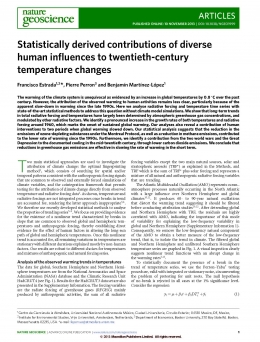Statistically derived contributions of diverse human influences to twentieth-century temperature changes
Year:
2013
Publisher:
Macmillan Publishers Limited
The warming of the climate system is unequivocal as evidenced by an increase in global temperatures by 0:8 C over the past century. However, the attribution of the observed warming to human activities remains less clear, particularly because of the apparent slow-down in warming since the late 1990s. Here we analyse radiative forcing and temperature time series with state-of-the-art statistical methods to address this question without climate model simulations.We showthat long-term trends in total radiative forcing and temperatures have largely been determined by atmospheric greenhouse gas concentrations, and modulated by other radiative factors.We identify a pronounced increase in the growth rates of both temperatures and radiative forcing around 1960, which marks the onset of sustained global warming. Our analyses also reveal a contribution of human interventions to two periods when global warming slowed down. Our statistical analysis suggests that the reduction in the emissions of ozone-depleting substances under the Montreal Protocol, aswell as a reduction in methane emissions, contributed to the lower rate of warming since the 1990s. Furthermore, we identify a contribution from the two world wars and the Great Depression to the documented cooling in the mid-twentieth century, through lower carbon dioxide emissions.We conclude that reductions in greenhouse gas emissions are effective in slowing the rate of warming in the short term.
Reference URL:
Nro Pages:
6
Work regions:
Publication Type:
Publication language:
English

Files:
